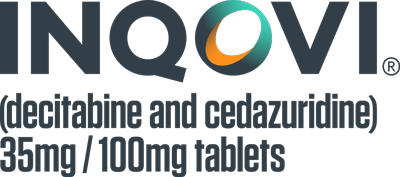What is INQOVI?
Proven results with
an oral HMA patients
may prefer1-3
The only oral at-home HMA for
your appropriate patients with myelodysplastic syndromes (MDS)
and CMML1,3
Oral INQOVI delivered equivalent systemic exposure to IV decitabine
when given once daily for 5 days.1,2




Who is INQOVI for?
INQOVI is indicated for treatment of adult patients with myelodysplastic syndromes, including1:
- previously treated and untreated, de novo, and secondary MDS with the following French‑American‑British subtypes:
- refractory anemia
- refractory anemia with ringed sideroblasts
- refractory anemia with excess blasts
- chronic myelomonocytic leukemia
- intermediate-1, intermediate-2, and high-risk International Prognostic Scoring System groups
Decitabine and cedazuridine (INQOVI) is the only FDA-approved oral hypomethylating agent (HMA) option in MDS (IPSS intermediate-1 and above) that the National Comprehensive Cancer Network® (NCCN) recommends could be a substitution for IV decitabine1,4,5
Oral decitabine and cedazuridine (DEC-C) (NCCN Category 2A†) could be a substitution for intravenous decitabine in patients with IPSS intermediate-1 and above in the NCCN Clinical Practice Guidelines in Oncology (NCCN Guidelines®) for Myelodysplastic Syndromes.5
- Do not substitute decitabine and cedazuridine (INQOVI) for an IV decitabine product within a cycle1
Watch the video to understand how patients with MDS feel about the impact of IV/SC therapy and why they may prefer an oral option like INQOVI3
†Category 2A: Based upon lower-level evidence, there is uniform NCCN consensus that the intervention is appropriate.5
CMML=chronic myelomonocytic leukemia; FDA=US Food and Drug Administration; IPSS=International Prognostic Scoring System.
References: 1. INQOVI [package insert]. Princeton, NJ: Taiho Oncology, Inc.; 2022. 2. Garcia-Manero G, McCloskey J, Griffiths EA, et al. Oral decitabine-cedazuridine versus intravenous decitabine for myelodysplastic syndromes and chronic myelomonocytic leukaemia (ASCERTAIN): a registrational, randomised, crossover, pharmacokinetics, phase 3 study. Lancet Haematol. 2024;11(1):e15-e26. 3. Zeidan AM, Perepezko K, Salimi T, et al. Patients’ perspectives on oral decitabine/cedazuridine for the treatment of myelodysplastic syndromes/neoplasms. Ther Adv Hematol. 2024;15:20406207241257313. 4. Zeidan AM, Zhao R, Pierre-Victor D, et al. Real-world use patterns and clinical outcomes for myelodysplastic syndrome patients initiating oral decitabine and cedazuridine or intravenous/subcutaneous hypomethylating agents. Blood. 2024;144(suppl 1):5189-5190. 5. Referenced with permission from the NCCN Clinical Practice Guidelines in Oncology (NCCN Guidelines®) for Myelodysplastic Syndromes. V.2.2025. © National Comprehensive Cancer Network, Inc. 2025. All rights reserved. Accessed March 25, 2025. To view the most recent and complete version of the guideline, visit NCCN.org. NCCN makes no warranties of any kind whatsoever regarding their content, use or application and disclaims any responsibility for their application or use in any way.
